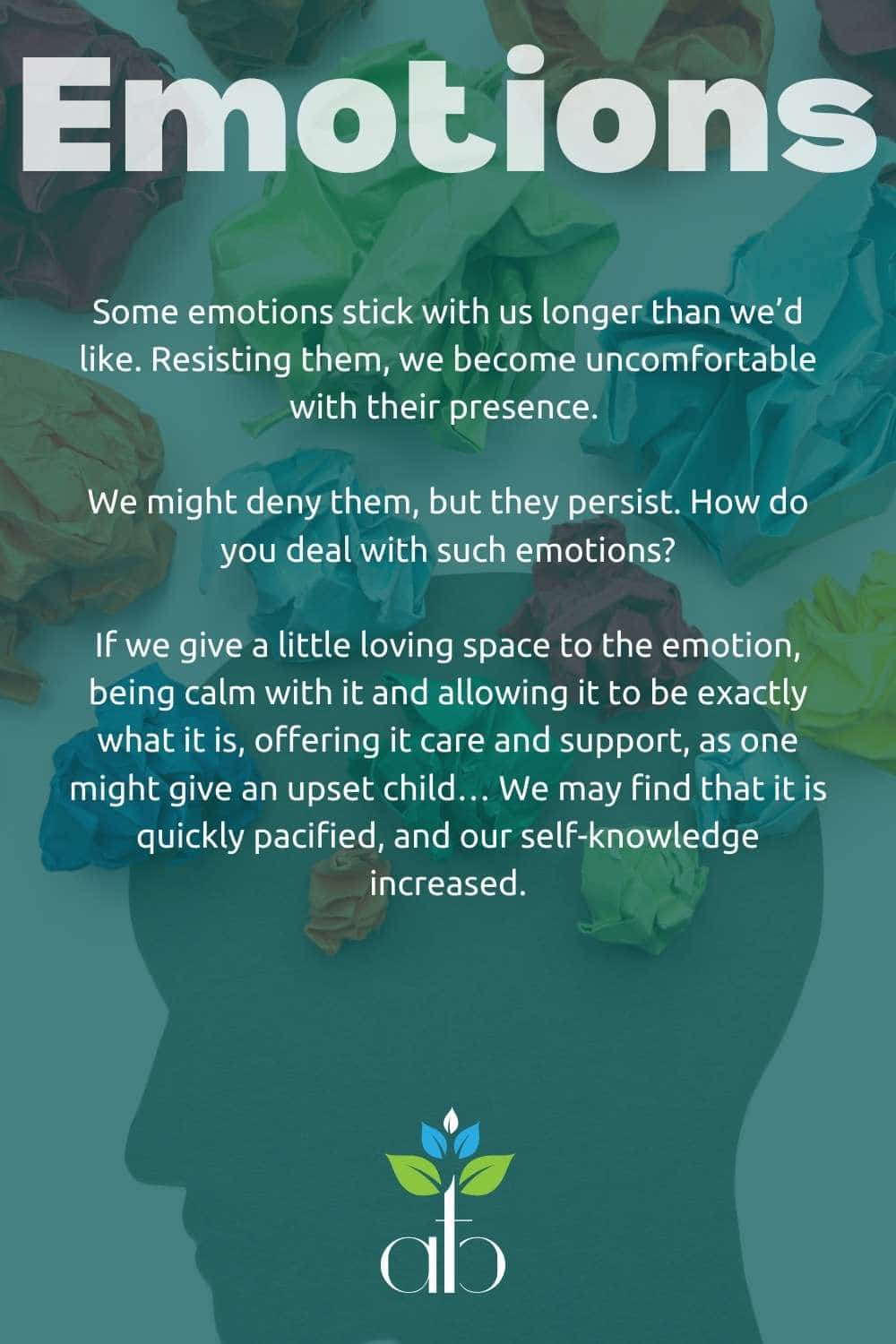Episode 123
Lean Into Your Emotions

Some emotions stick with us longer than we’d like. Resisting them, we become uncomfortable with their presence. We might deny them, but they persist. How do you deal with such emotions?
One strategy is Viktor Frankl’s concept of paradoxical intention. By attempting to feel the emotion as intensely as possible, we might find that our experience of it is instantly transformed. In some way, the quality of the emotion is the same, but now we can see that it’s not entirely unpleasant. Having felt it, acknowledge it entirely, we might find that it simply leaves.
We also might try observing it, giving it space, and an intellectual eye. Ask little questions about it, such as, where is it in the body? What is its texture – rough, smooth, something else? Is it bright or dark? What colour is it? What flavour is it? By observing it patiently, with affection, we might start to understand what this emotion has brought for us.
Similarly, if we give a little loving space to the emotion, being calm with it and allowing it to be exactly what it is, offering it care and support, as one might give an upset child… We may find that it is quickly pacified, and our self-knowledge increased.
Hosts & Guests
Kurt Robinson
Transcript
So there’s a bunch of strategies, techniques, perspectives and ways of looking at our emotions. When you have kind of a negative emotion or what you might call a negative emotion it might stick around for some time if we don’t confront it so a lot of the time we will try to bypass it, distract ourselves from it, which can be helpful but its not necessarily getting to the root of the issue.
A lot of the time when we feel an emotion there is a point to it.
Our emotions are not random. And its not necessarily that’s like “oh Im in love with this person that means we are meant to be together. It’s not quite that simple or that complicated perhaps because when we feel our emotions we start to interpret them and the interpretation we have of it isn’t always correct.
But yes its true emotions have meanings for us, they have messages for us. When we can correctly interpret those messages we find that we can leave those emotions behind.
I used to say squeeze the sponge dry. What does that mean?
Well there’s a related concept of paradoxical intention described by Viktor Frankl in Man’s Search for Meaning.
So for example Frankl had a problem where he was young and he used to stutter all the time. But when he reflected on his experiences he found the only time he didn’t stutter was when he was caught on a tram without a ticket and he intentionally tried to stutter to gain some sympathy from the conductor so he wouldn’t have to pay a fine or get kicked off the train.
Thats the principle of paradoxical intention sometimes if we try to do something that maybe otherwise we would like to avoid sometimes we can’t do it or we experience it in a different way.
If you have a feeling terror, sadness, despair or fear if you feel it directy and say “Ok Im going to feel this as much as a possibly can” you might find instantly start to have a very different experience with that emotion.
Its not unpleasant, its something else. Maybe its not entirely pleasant but its not unpleasant.
Squeezing the sponge dry, I call that or paradoxical intention. Trying to move deeply into that within that or the other way of looking at that is my friend Helinka. She’s getting into therapy.
She had a recent breakup that was difficult for her but some of the messages from therapy helped. She leaned into the emotions, leaning into them.
I like to think of this, my friend Chris is very into his body, trying to solve things in the body like get more flexibility in vertebra so he can have a healthy back or something like that. And he found out about this idea of myofascial release and what this means is like people will take for example a lacrosse ball or a tennis ball and lie on it.
Because of the pressure of gravity pressing down on the body against this ball it will put some pressure down into a muscle and it will allow that muscle to release.
Now what Chris says to me is that you want to ride the line, ride the line of pain so you feel a bit of pain but you don’t get completely consumed by it or another way people say it is it hurts so good.
Your not completely consumed by it and its like “Hmm something is getting better here, something is improving”
And that’s how it is with your emotions, it’s an analogy. Not a perfect analogy but by leaning into your emotions is a similar release, releasing tension in your muscles or just like with a massage.
You don’t come in and like smash the muscles, well sometimes you might but you find the tension and you just apply just the right amount of pressure to get it to release. Feels good.
Now sometimes I compare certain strategies for dealing with emotions to parents and grandparents.
So you have this overbearing father and what he does is he’s coming in directly and knocking on the door of your room, maybe even breaks down the door and says “Hey, what is going on? Tell me what is going on with you! Tell me what’s wrong, I need to know now.
And of course what happens when you make those kinds of demands?
Well the quickest way to inspire a gag reflex is to force feed someone, it makes you recoil.
And likewise with emotions they act in the same way. They’ll be like “Hey, I’m just trying to do my thing, leave me alone. You won’t find out what’s really going on with the emotions”
The other parent is the mother in denial. I guess there could be other forms of the mother …obviously these are immature strategies. They are not the best strategies.
The mother in denial just pretends that she does not have that emotion or she even says to the emotion “Well, I’ll deal with that later”
What happens is she keeps saying “I’ll deal with that later”
Its like every time she has some dust to sweep up she just sweeps or the junk goes into the broom closet and never gets clean. So these things start to build up and build up which you know sometimes its fine to say “I will deal with that later.”
Like if you’re in a certain situation that you don’t have time to deal with your emotions but if you deal with this habitually in some way your broom closet is going to build up with a lot of mess and its going to be so much more difficult to entangle.
So much more difficult to tidy up over time. The other strategies, the grandparents, so they’re a bit wiser and a bit more patient. So you have the grandfather and his strategy is like “Whats going on?”
So he gets closer to observe but not close enough to be intrusive, a little close to the emotions.
Maybe he starts to ask some questions that in a way are intellectual. He said “What does this emotion feel like? Where is it in the body? What is the texture, the color? Does it have a sound associated with it? Is it rough, is it harsh? Is it smooth, is it bright? Whats the flavor of this emotion?”
By doing that you can start to get a better idea of what’s going on inside you. Feeling it, but gently.
The other strategy is the grandmother. The grandmother again she has that safe distance and at the same time she just accepts the emotion just like I mentioned the other day the sound selfie on Erika Harris’ podcast the Work of the Empath.
I mentioned that scene from the interview from the video with Karl Rogers and Karl Roger’s says to the young black man “You are free to feel anger right here with me. “
And the young man says “You really mean that?”
And Karl Roger’s says “Damn straight.”
And that’s the kind of beautiful space that you can allow your emotions.
As I wrote in a lyric once “Give yourself space to transform”
With that loving allowing acceptance, that unconditional positive regard.
As Karl Rogers described it that is what can allow these emotions to transform and perhaps what you once thought was negative will actually become a blessing.
Thanks for listening, have a wonderful day.

New Episodes Every Weekday
11am Mexico City time
10 min episodes Monday - Thursday
1 h interview episode on Fridays
As an Amazon Associate I earn from qualifying purchases.
Stay Beautiful &
Stay Connected
